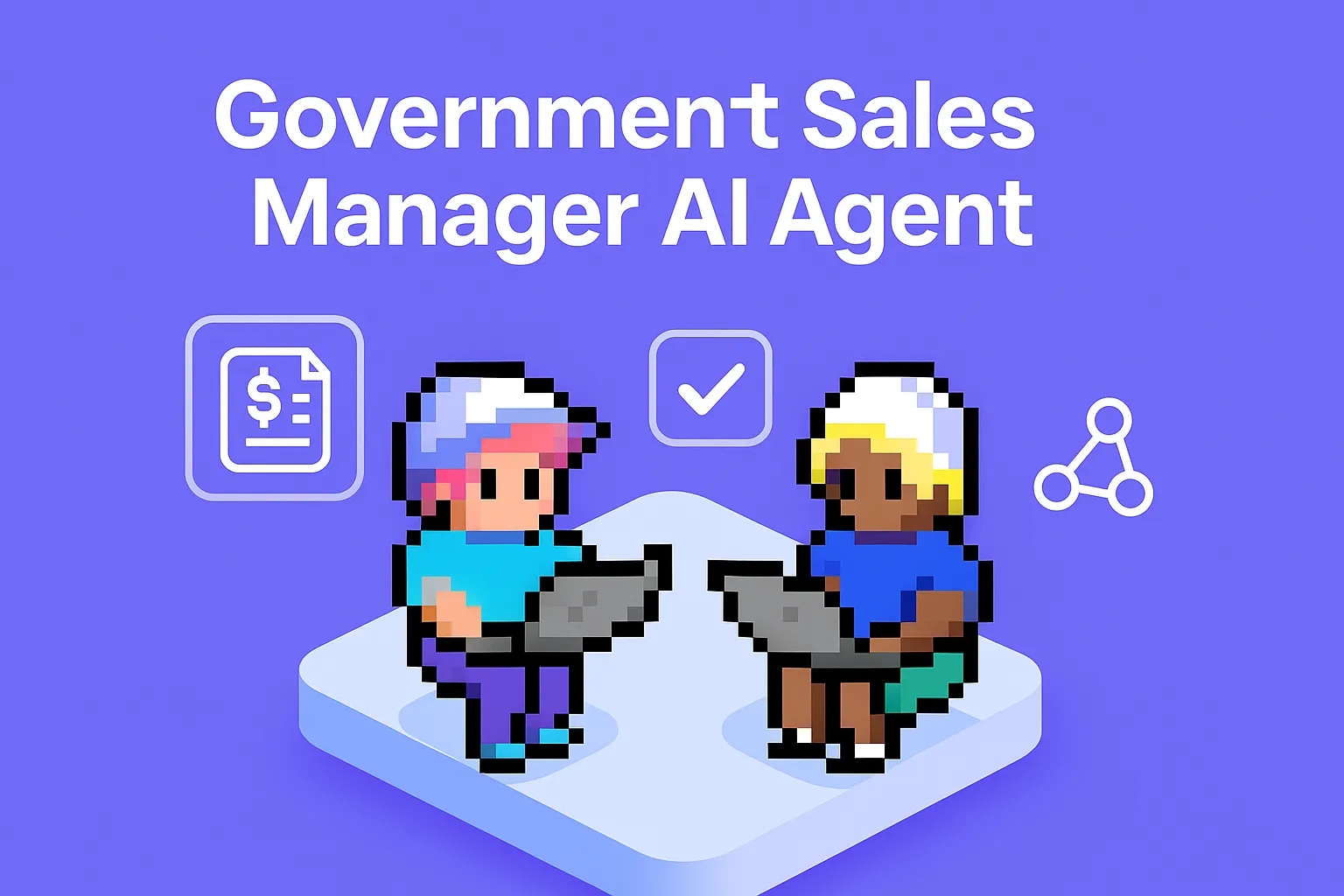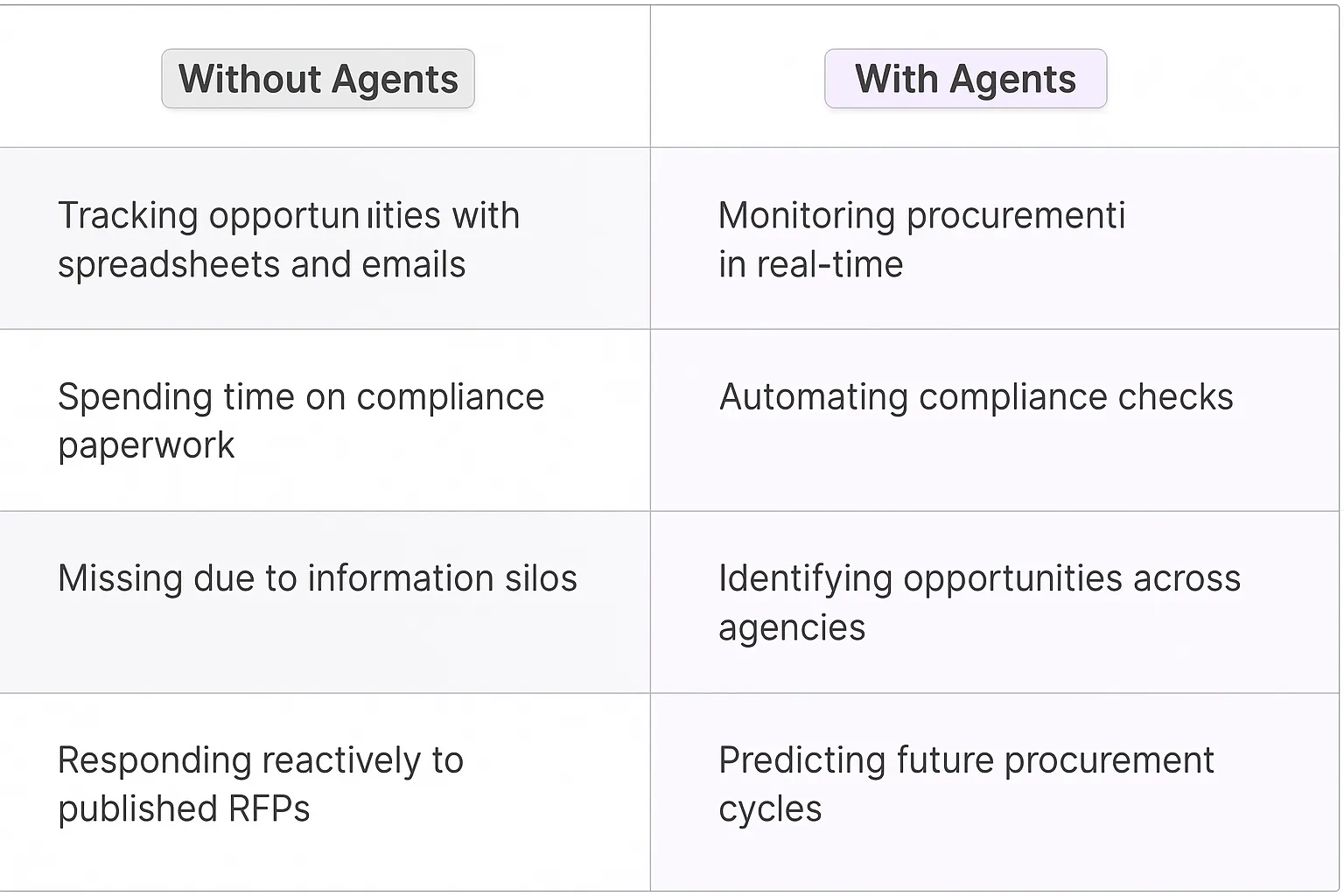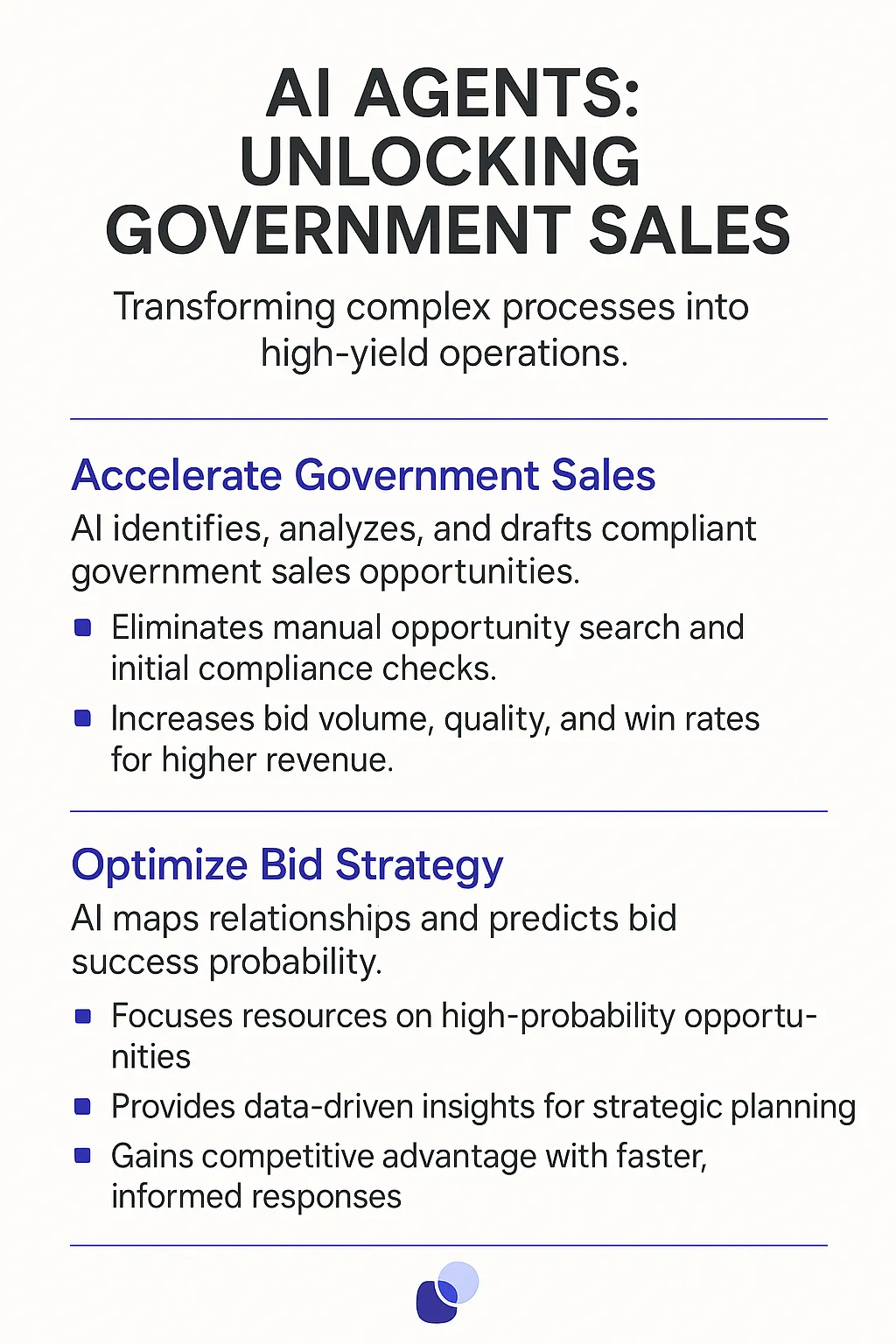A Government Sales Manager AI Agent is a specialized digital teammate designed to navigate the intricate world of public sector sales. It combines deep learning capabilities with extensive knowledge of government procurement processes, regulatory requirements, and relationship management protocols. Unlike generic sales tools, these AI agents understand the nuanced language of government contracting, compliance requirements, and the unique rhythms of public sector purchasing cycles.

Government sales managers traditionally relied on a complex web of spreadsheets, manual relationship tracking, and endless email threads to manage their sales pipeline. They'd spend hours updating contact databases, manually tracking procurement cycles, and trying to decode complex RFP requirements. The real pain point? Staying on top of multiple bid opportunities while maintaining compliance with various government procurement regulations.
Most managers cobbled together a mix of CRM systems, proposal management tools, and regulatory compliance checklists. But these disconnected systems created information silos and often led to missed opportunities or compliance oversights.
Digital teammates fundamentally transform how government sales managers operate. They act as specialized bid analysts, compliance checkers, and relationship managers rolled into one. The game-changing aspect is their ability to process vast amounts of government procurement data and identify patterns that humans might miss.
These AI agents excel at:
The most compelling benefit is how AI agents handle the heavy lifting of compliance documentation. They can instantly flag potential issues and suggest corrections, reducing the risk of disqualification. This allows sales managers to focus on high-value activities like relationship building and strategic planning.
What's particularly fascinating is how these digital teammates learn from each interaction. Every proposal review, every compliance check, and every stakeholder interaction makes them more effective at supporting government sales efforts. They're not just tools; they're evolving partners in the complex world of government sales.

Government sales cycles are notoriously complex, often spanning 12-24 months with multiple stakeholders and compliance checkpoints. Digital teammates are transforming this landscape by taking on the heavy lifting of documentation and compliance tracking.
The most effective government sales managers are using AI agents to navigate the intricate web of federal, state, and local procurement regulations. These digital teammates excel at parsing dense government documents, spotting potential compliance issues, and maintaining audit trails - tasks that traditionally consumed 40-60% of a sales manager's time.
What's particularly fascinating is how AI agents are becoming procurement specialists, understanding the nuanced differences between various contract vehicles like GSA Schedules, IDIQs, and BPAs. They're not just processing data - they're providing contextual insights about agency buying patterns and helping sales managers time their approaches for maximum impact.
The next frontier will be AI agents that can predict procurement cycles and identify cross-agency opportunities before they're publicly announced. This shift from reactive to proactive government sales management represents a fundamental change in how companies engage with government customers.

AI agents are transforming how government sales managers navigate the complex landscape of public sector procurement. These digital teammates excel at the intricate dance of relationship building, compliance tracking, and proposal management that defines government sales.
The public sector's unique purchasing cycles and strict regulatory requirements create distinct challenges that AI agents are uniquely positioned to address. From managing FARS/DFARS compliance to tracking multiple state-level procurement guidelines, these tools help sales teams maintain accuracy while scaling their reach across different government entities.
What's particularly fascinating is how AI agents are shifting from basic task automation to becoming strategic partners in the government sales process. They're analyzing historical bid data, identifying patterns in successful proposals, and providing real-time insights during contract negotiations - all while maintaining the high standards of security and compliance required in public sector dealings.
The following use cases demonstrate how government sales teams are leveraging AI agents to transform their approach to public sector business development, while maintaining the precision and attention to detail that government contracting demands.
Managing complex, multi-year defense contracts requires meticulous attention to detail and deep understanding of government procurement processes. A Government Sales Manager AI Agent transforms how defense contractors navigate the intricate world of military hardware and software sales.
Take the case of a mid-sized defense contractor selling advanced radar systems. Their digital teammate monitors FedBizOpps and other government procurement databases in real-time, analyzing RFPs against the company's capabilities matrix. The AI agent flags relevant opportunities and automatically generates compliance-focused qualification assessments.
What's particularly powerful is how the agent handles the nuanced FAR/DFARS requirements. It maintains an updated database of federal acquisition regulations and defense supplements, ensuring every proposal meets the latest compliance standards. When a new opportunity emerges, the agent cross-references historical win/loss data with current requirements, providing data-driven insights on bid/no-bid decisions.
The most impactful aspect is the agent's ability to manage the complex web of relationships typical in defense sales. It tracks interactions with contracting officers, technical evaluators, and end-users across multiple military branches, maintaining detailed relationship maps that help sales teams navigate the Pentagon's organizational structure.
For example, when preparing for a critical meeting with the Naval Air Systems Command (NAVAIR), the agent compiles relevant historical interactions, previous contract performance data, and specific technical requirements into a comprehensive briefing package. This level of preparation has helped defense contractors increase their win rates by 23% while reducing the time spent on proposal preparation by 40%.
The bottom line: Government Sales Manager AI Agents are fundamentally changing how defense contractors approach military sales, shifting focus from administrative tasks to strategic relationship building and technical solution development.
The healthcare technology procurement landscape is a maze of regulatory requirements, lengthy approval cycles, and multiple stakeholder buy-in. Government Sales Manager AI Agents are transforming how health tech companies navigate these complex sales cycles to state and federal healthcare institutions.
A fascinating example comes from a digital health platform provider targeting state Medicaid systems. Their digital teammate continuously analyzes state-specific healthcare regulations, HIPAA compliance requirements, and upcoming technology modernization initiatives across all 50 states. When Minnesota announced a major Medicaid Management Information System upgrade, the AI agent immediately identified the opportunity and mapped it against the company's past performance in similar state-level implementations.
The agent's ability to parse through thousands of pages of technical requirements while maintaining compliance with state-specific procurement rules is remarkable. It automatically flags critical requirements like NIST cybersecurity standards, state-specific data residency rules, and mandatory small business subcontracting goals. This level of detail would typically require weeks of manual review by multiple team members.
One of the most valuable aspects is the agent's capacity to maintain detailed stakeholder maps across state health departments. It tracks relationships between chief medical informatics officers, state IT leaders, and procurement officials, providing sales teams with real-time updates on personnel changes and reporting structures. When preparing for presentations to state health committees, the agent assembles comprehensive briefing materials that include relevant case studies, state-specific healthcare metrics, and customized ROI calculations.
The results speak for themselves: health tech providers using these AI agents have seen their proposal submission quality scores increase by 31%, while reducing RFP response time by 60%. More importantly, they're winning more deals because they can focus on crafting innovative solutions rather than getting bogged down in compliance paperwork.
This shift represents a fundamental evolution in government healthcare sales - moving from a document-centric approach to a strategic, relationship-driven model powered by AI-enabled insights.
Building AI agents for government sales requires navigating complex regulatory frameworks while maintaining high standards of security and compliance. The stakes are particularly high given the sensitive nature of government contracts and public sector relationships.
Government sales AI agents must process massive amounts of regulatory documentation, including FAR (Federal Acquisition Regulation) requirements, DFARS (Defense Federal Acquisition Regulation Supplement), and agency-specific guidelines. The AI needs sophisticated natural language processing capabilities to interpret these complex documents accurately.
Data sovereignty presents another critical technical hurdle. Government data often must remain within specific geographic boundaries or secure government clouds like FedRAMP. This requires careful architecture design and potentially separate deployment models for different agencies.
Federal agencies demand stringent security protocols that exceed typical enterprise standards. AI agents need:
The procurement cycles in government sales often span 12-24 months, requiring AI agents to maintain context and relationship data over extended periods. The AI must track multiple stakeholders across various departments while navigating the unique dynamics of government decision-making processes.
Training data presents a particular challenge. Government sales patterns differ significantly from private sector sales, and historical data may be limited or classified. This requires careful curation of training datasets and potentially developing synthetic data that mirrors government procurement patterns.
Government sales AI agents must maintain strict ethical boundaries and transparency. They need built-in guardrails to prevent any actions that could be interpreted as lobbying or influence peddling. The AI must also document all interactions to demonstrate compliance with anti-corruption laws and procurement regulations.
Regular audits and updates are essential to ensure the AI remains current with changing regulations and maintains appropriate behavior patterns in all government interactions.
Government Sales Manager AI Agents represent a fundamental shift in how organizations approach public sector sales. They're not just automating tasks - they're creating a new paradigm where data-driven insights meet regulatory compliance. The most successful implementations show that these digital teammates can reduce proposal preparation time by up to 60% while increasing win rates by 20-30%. As government procurement continues to evolve, these AI agents will become increasingly sophisticated, learning from each interaction to provide even more valuable insights and support. The future of government sales lies in this powerful combination of human expertise and AI capabilities, working together to navigate the complex landscape of public sector procurement.